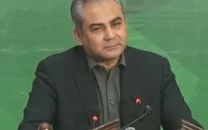SCBA set to challenge lifetime disqualification of MPs
Bhoon says petition ready to challenge disqualification under Article 62(1)(f) of the Constitution

The Supreme Court Bar Association (SCBA) is set to move against lifetime disqualification of lawmakers under Article 62(1)(f) of the Constitution in the apex court.
SCBA President Ahsan Bhoon confirmed to The Express Tribune on Monday that the lawyers’ body had prepared a petition which would be filed in the Supreme Court.
The SCBA president is an opponent of the lifetime ban on lawmakers, who had been disqualified by the court of law under Article 62(1)(f) of the Constitution. The apex court had also disqualified former prime minister Nawaz Sharif and Jahangir Tareen under the same article.
The Article 62 – some provisions of which were introduced by military dictator late Gen Ziaul Haq – relates to the qualification of parliamentarians. The article stipulates that a person cannot be qualified as a member of the national or provincial legislatures if he is not ‘Sadiq’ and ‘Ameen’.
Earlier, the superior courts had shown restraint in disqualifying lawmakers for more than two decades. However, soon after his restoration in March 2009, former chief justice Iftikhar Muhammad Chaudhry enforced Article 62 and the Article 63, disqualifying lawmakers by exercising suo motu jurisdiction.
Dozens of lawmakers were disqualified under the articles by the superior courts for having fake degrees, dual nationalities and concealment of assets.
In 2018, then chief justice Saqib Nisar had constituted a five-judge larger bench led by himself to examine whether or not the disqualification under Article 62(1)(f) of the Constitution was for life.
The Supreme Court had held that if it declared that a lawmaker was not ‘Sadiq’ and ‘Ameen’ [truthful and trustworthy] under the article, then he or she would be permanently disqualified from contesting the elections.
The court had appointed Muneer A Malik and Ali Zafar as amicus curiae in this case and both had opposed the lifetime disqualification. The Supreme Court had also rejected the contentions of (late) Asma Jahangir, Sakindar Bashir Mohmand, Sardar Aslam, Kamran Murtaza, who were opposing the lifelong disqualification.
Justice Umar Ata Bandial had authored a 52-page ruling that justified permanent disqualification of the parliamentarians under the constitutional provision. Instead of referring the matter to parliament to take a final decision on the time duration of disqualification, the court comprehensively discussed the importance of Article 62(1)(f).
The verdict said that Article 62(1)(f) of the Constitution imposed Islamic ethical conditions for eligibility of a candidate for the election to parliament but these were made applicable to both Muslim as well as non-Muslim candidates for parliamentary membership.
Also read: Only parliament has the authority to amend lifetime disqualification law: Aitzaz Ahsan
The court also reproduced current code of conduct of the members of the United Kingdom. The judgment stated that “the universality of standards of honourable conduct in public life in the contemporary democratic world, irrespective of faith or culture, makes it plausible that firstly, the conditions of eligibility for election under Article 62(1)(f) of the Constitution are made applicable to all candidates for parliament, including non-Muslim candidates; and secondly, that these conditions have been retained by the elected parliament in the 18th Constitutional Amendment”.
The court said that the same constitutional provision was endorsed by 18th Amendment, wherein several adjustments were made that if the declaration by the court had attained finality, the embargo under Article 62(1)(f) of the Constitution acquired permanent effect.
“A court of law does not issue a declaration that offends mere sentiments or sensibilities. Consequently, a valid declaration by the court would involve the breach of a legal duty or obligation owed by the candidate for election to another person or the violation of the latter’s legal right or privilege.”
Justifying lifetime disqualification, Justice Bandial further said that a candidate for election, who had committed misconduct falling within the terms of Article 62(1)(f) of the Constitution, had on the Islamic and also universal criteria of honesty, integrity and probity, rendered himself unfit to hold public office.
However, the verdict is being criticised by senior lawyers due to different reasons. Firstly, they are objecting to the constitution of the bench to hear such an important issue. Out of the five, four judges – Saqib Nisar, Azmat Saeed Sheikh, Umar Ata Bandial and Ijaz ul Ahsan – are from the province of Punjab.
Justice Sajjad Ali Shah, who belongs to Sindh, was also part of that larger bench. Interestingly, most of these judges were also part of the benches, which issued rulings in high-profile cases, relating to the Panama Papers, The Elections Act 2017, and the Hanif Abbasi case.
Legal experts believe that such matters should either be fixed before a full court, or if the CJP constitutes larger benches, proper representation of each province should be ensured to remove any negative perception.
They also say that larger bench, comprising the senior-most judges, should hear the SCBA petition in this regard. Some senior lawyers point out several inconsistencies in matters, which were adjudicated under Article 62(1)(f) of the Constitution.
Interestingly, a murderer can contest elections after a specific time, but a lawmaker, who lies under oath, has been barred permanently, they say.
In October 2018, the apex court in Khawaja Asif case finally laid down an ‘objective criterion’ to test the honesty of a lawmaker by declaring that the Article 62(1)(f) could not be applied to every omission or non-disclosure of assets.
Later, the court set aside the lifetime disqualification of Pakistan Tehreek-e-Insaf (PTI) Balochistan chief Yar Muhammad Rind in the fake degree case, declaring that such disqualifications must be based on oral or documentary evidences and not presumptions.
The Supreme Court judgment in Khawaja Asif case held that mere omission to list an asset could not be labelled as dishonesty unless some wrongdoing was associated with its acquisition or retention, which had duly established in the judicial proceedings.
In May, the apex court reiterated that it was now a well-settled principle that every non-disclosure or misdeclaration would not be sufficient enough to permanently disqualify a member of parliament or a candidate under the Article 62 (1) (f) of the Constitution.
“The purpose and intention needs to be seen behind the non-disclosure or misdeclaration. The returned candidate would be disqualified only when if he/she has dishonestly acquired assets and is hiding them to derive certain benefits,” says an 11-page judgment authored by Justice Sayyed Mazahar Ali Akbar Naqvi.
The verdict was issued on a petition filed by a politician, Shamona Badshah Qaisarani, who was disqualified for lifetime over non-disclosure of her agricultural property inherited from her parents in the nomination papers.
“If the non-disclosure or misdeclaration is such that it gives an illegal advantage to a candidate, then it would lead to termination of his candidature,” the judgement added.
Also read: The mixed legacy of CJP Nisar
A three-judge bench, headed by Justice Umar Ata Bandial and comprising Justice Muhammad Qazi Amin Ahmed and Justice Sayyed Mazahar Ali Akbar Naqvi, posed questions whether the omission by the appellant of non-mentioning the agricultural property inherited from her parents was sufficient enough to disqualify her permanently, and whether the declaration of disqualifying the appellant in terms of Article 62(1)(f) of the Constitution was based on proper scrutiny of the evidence evaluated by a court of competent jurisdiction and in accordance with the law laid down by this court.
In the judgment, Justice Naqvi referred to the Supreme Court ruling in Khawaja Muhammad Asif’s case wherein the court held that merely the fact that a candidate had not declared an asset in the nomination papers would not end in his disqualification but it had to be seen whether the act of non-disclosure of the asset was with dishonest intent or not and only if there is dishonest intent behind the nondisclosure, the candidate would be disqualified.
The court also said that it was the credibility of the explanation that would be the determining factor as to whether non-disclosure of an asset carries with it the element of dishonesty or not. In view of the latest judgment, several lawyers contends that Jahangir Tareen could not be disqualified for life.



















COMMENTS
Comments are moderated and generally will be posted if they are on-topic and not abusive.
For more information, please see our Comments FAQ